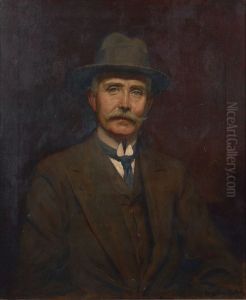Frederick William Elwell Paintings
Frederick William Elwell was a British painter born in Beverley, East Yorkshire, on June 29, 1870. Renowned for his realistic portrayals and mastery in capturing light, Elwell's oeuvre includes a wide range of subjects, from domestic scenes and portraits to landscapes and historical themes. His early education in art began at the Lincoln School of Art, after which he further honed his skills at the Royal Academy Schools in London, and later at the Académie Julian in Paris. It was in Paris where he was significantly influenced by the French realist and impressionist movements, elements of which he incorporated into his own work.
Elwell's career was marked by both commercial success and critical acclaim. He exhibited frequently at the Royal Academy from 1894 onwards and was elected a member of the Royal Society of British Artists in 1906. His paintings were also shown internationally, including at the Paris Salon, where he received commendation for his work. In 1914, he married Mary Dawson Holmes, an artist who became not only his partner in life but also his frequent collaborator. Together, they became central figures in the artistic community of Beverley and the East Riding of Yorkshire.
Elwell's paintings often reflect his keen observation of social nuances and a profound empathy for his subjects. His ability to depict the interplay of light and shadow brought a vibrant realism to his work, earning him a distinguished place among British artists of his time. During World War I, he contributed to the war effort by creating several notable works depicting scenes from the home front.
After the war, Elwell continued to paint and exhibit widely, with his work evolving to include more serene and contemplative subjects. He was deeply involved in the local art scene and was instrumental in the establishment of the Beverley Art Gallery, to which he and his wife donated a significant number of works. Throughout his career, Elwell received numerous accolades and was highly respected by his peers and art critics alike.
Frederick William Elwell passed away on January 3, 1958, leaving behind a legacy that has continued to be celebrated for its contribution to British art. His paintings remain highly sought after and are held in private collections and museums across the UK, serving as a testament to his skill and vision.
